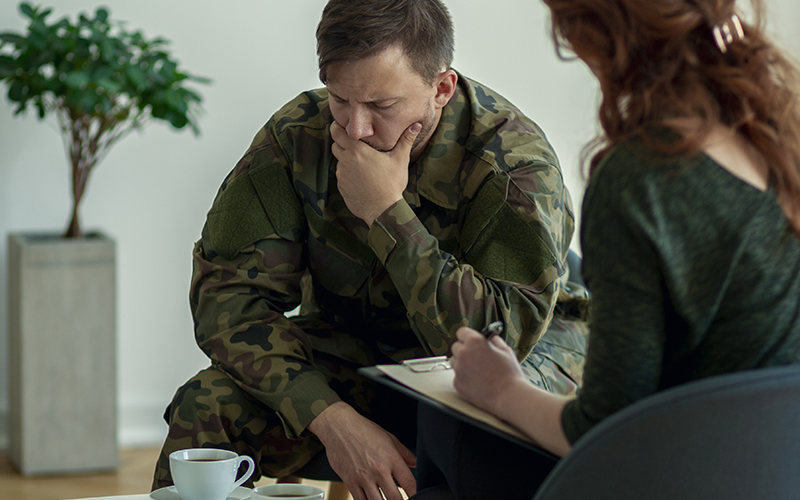This Is Post-Traumatic Stress Disorder
Ernesto just returned from Afghanistan where he witnessed an improvised explosive device (IED) destroy a Humvee in his convoy, killing his best friend. Now that he’s back home, he’s no longer the easy-going guy he once was. He has angry outbursts at the slightest provocation and uses illegal drugs to repress his wartime memories.
When Liz was seven years old, her stepfather sexually abused her. Now in her thirties, she wants to put the past behind her but can’t. She’s unable to establish intimate relationships and has frequent nightmares about her abuse.
It may not appear that Ernesto’s wartime experience has much in common with Liz’s sexual abuse, but it does. As a result of the trauma they’ve each experienced, they both now suffer from Post-Traumatic Stress Disorder or PTSD.
What Is PTSD?
Post-Traumatic Stress Disorder, PTSD is an anxiety disorder that affects individuals who’ve experienced firsthand (or witnessed) intensely traumatic events. Stressors known to cause PTSD include: violent personal attacks such as assault, physical and/or sexual abuse, rape, mugging or murder; car, plane or train accidents; military combat; captivity; and natural disasters, such as hurricanes, tornadoes or earthquakes.
Although most experts agree that 1 in 10 children and adults has PTSD, not everyone who experiences a traumatic event will develop the condition. Experts are uncertain as to why some people suffer from PTSD while others, who’ve experienced similar trauma, do not.
How Do You Know If You Have PTSD?
Symptoms of PTSD can occur months or even years after a traumatic event and typically fall into three categories:
1. Avoidance/Withdrawal. You tend to avoid activities, situations or people that remind you of the trauma. As a result, you may withdraw from friends, family and activities you once enjoyed. You may have a partial or total memory lapse of the traumatic event. For example, Ernesto rarely leaves the house and refuses to let his wife, Maria, go anywhere alone. His heightened state of alert, trying to protect her as he feels he failed to do with his best friend, has meant increased isolation for the couple, as Maria gives in to his fear.
2. Reliving the Experience. You have frequent and vivid memories of the traumatic event. Your recurring nightmares, flashbacks or hallucinations are triggered by certain images, smells and sounds. You may experience anxiety, difficulty concentrating, agitation, outbursts or fatigue.
3. Emotional Numbness. You may “check out” emotionally to avoid situations that might trigger painful emotions. As a result, you may have a difficult time experiencing and expressing emotions or maintaining intimate relationships. For example, Liz both craves and fears intimacy with a significant other and, as a result, has had a series of one-night stands. This allows her to feel connected physically, but means she avoids experiencing, and ultimately coming to terms with, the painful feelings associated with her trauma.
People with PTSD may also experience: Substance or alcohol abuse; difficulty finding and/or keeping a job; physical symptoms such as headaches/migraines, breathing irregularities or tightness in the chest; insomnia; increased risk of depression; and suicidal thoughts.
Coping with PTSD
Although there is no “one size fits all” treatment for PTSD three successful options are:
1. Seek professional help: Therapy can help you to reinterpret how you react to your experiences. Discovering what makes you afraid or upset is the first step in finding ways to replace old, harmful thoughts and feelings with new ones that more accurately reflect the situation.
2. Support groups: Communicating and sharing traumatic experiences with others who’ve had similar experiences helps you process and work through feelings of anger, guilt and fear. Symptoms may never completely disappear, but sharing thoughts and feelings in a structured, safe environment helps manage them while building self-confidence and trust.
3. Self-care: Scheduling time to reflect on the trauma rather than allowing a constant flow of worrying thoughts helps to manage symptoms. As well, living a healthy lifestyle that includes eating healthfully, exercising and getting adequate sleep can help you recover. Yoga and massage can also be helpful.
PTSD is a serious condition. If you recognize the symptoms in yourself or a loved one, seek treatment right away.
A New Outlook Counseling Services
A New Outlook Counseling Services provides therapy for those individuals with mental health issues, needing marriage counseling or relational therapy, or help with addictions to drugs or alcohol.
We have offices to serve Colorado…the Healing Begins Here
Author’s content used under license, © Claire Communications


Recent Comments